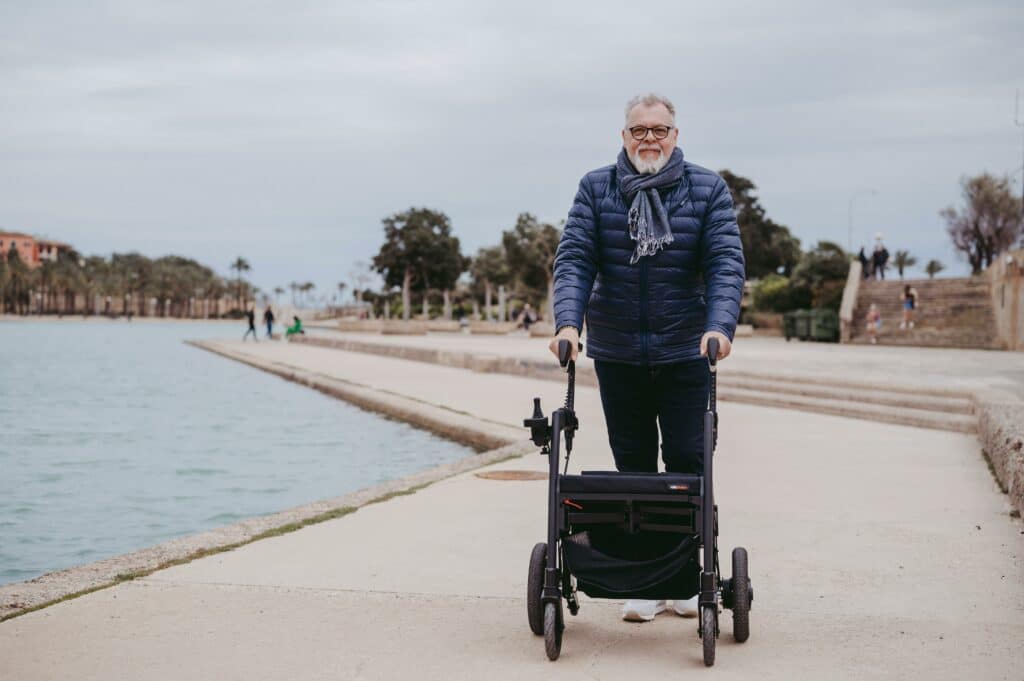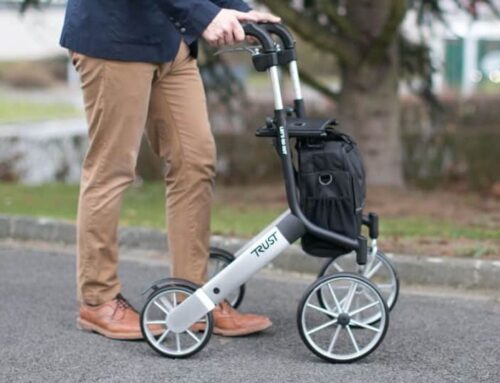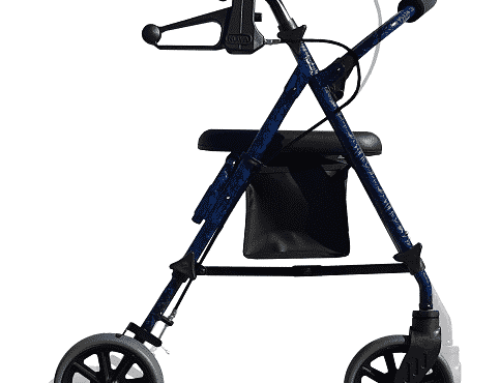Rollators: Promoting Mobility and Enhancing Post-Surgery Recovery
Recovering from surgery can be a challenging journey, often requiring assistance for basic mobility and daily activities. Discover how rollators revolutionize post-surgery recovery, making mobility safer and faster than ever! Rollators, as modern assistive devices, play a crucial role in this recovery phase, particularly in promoting mobility and reducing the risk of complications such as blood clots. In this comprehensive article, we’ll explore how rollators can aid in post-surgery recovery, focusing on their benefits, selection criteria, and effective usage.

How Can Rollators Help with Post-Surgery Recovery?
Post-surgery recovery often involves a gradual return to regular activities, and mobility is a critical aspect of this process. Rollators, which are essentially walkers with wheels and brakes, offer significant support here. They not only provide stability for those who are regaining their strength but also encourage movement, which is essential for improving blood flow and preventing blood clots, a common post-surgery complication.
The Importance of Rollators in Post-Surgery Recovery
Following surgery, especially operations involving the lower extremities or major abdominal procedures, patients are often advised to limit exertion. However, complete immobility can be detrimental, leading to muscle atrophy and circulatory problems like blood clots. Rollators strike a balance by allowing safe, controlled mobility. They support the body’s weight, reducing strain on the surgical site, and help maintain a steady pace, which is crucial for patients who might be prone to losing their balance or stamina.
Benefits of Using Rollators After Surgery

Using a rollator after surgery offers several advantages, which include but are not limited to:
- Enhanced Mobility: Rollators provide greater ease of movement compared to traditional walkers, facilitating smoother and more comfortable ambulation over different surfaces.
- Increased Independence: They enable users to move around without assistance, fostering self-reliance and contributing to mental well-being during the recovery process.
- Safety and Stability: Equipped with brakes, and often featuring a seat, rollators offer a safe option for resting, reducing the risk of falls, which is particularly important in post-surgery patients who might be prone to balance issues.
- Improved Physical Health: Facilitating movement, rollators aid in maintaining muscle tone and promoting better circulation, which is crucial in preventing post-operative complications like blood clots.
- Adjustable Support: Many rollators come with adjustable heights and handles, ensuring they can be tailored to the specific needs and comfort of the user.
- Social Engagement: By enabling greater mobility, rollators encourage users to engage in social activities and outdoor experiences, which is vital for emotional health and recovery.
- Customization Options: Various accessories, like baskets and trays, can be added to rollators, making it easier to carry personal items and perform daily tasks.
How to Choose the Right Rollator for Your Needs
Selecting an appropriate rollator is essential for ensuring maximum benefit. Consider the following aspects:
- Weight Capacity: Ensure that the rollator can comfortably support your body weight without compromising stability.
- Height Adjustability: The handles of the rollator should align with your wrist when you stand upright, ensuring ergonomic posture while walking.
- Wheel Size: Larger wheels are generally more suitable for outdoor use as they can navigate uneven terrain more easily, whereas smaller wheels are ideal for indoor use.
- Seat and Backrest: These features are important for rest, especially during longer periods of use. Ensure they are comfortable and adequately supportive.
- Storage Features: Options like baskets or pouches are useful for carrying personal items, enhancing the convenience of the rollator.
- Ease of Folding and Transport: If you plan to travel or store the rollator frequently, choose a model that is easy to fold and lightweight.
- Frame Material: The durability and weight of the rollator are influenced by its material, with aluminum being a popular lightweight choice.
Tips for Using a Rollator Safely and Effectively
To ensure safe and effective use of a rollator, consider these tips:
- Proper Posture: Maintain an upright posture while using the rollator. Avoid hunching over or leaning too far forward, as this can cause back strain.
- Brake Management: Always engage the brakes when resting or sitting on the rollator to prevent it from moving unexpectedly.
- Gradual Usage: Start with short distances and gradually increase as your strength and confidence improve.
- Regular Maintenance: Regularly check the rollator for any signs of wear and tear, particularly on the brakes and wheels, to ensure continued safety.
- Correct Walking Technique: Move the rollator slightly forward first, then step forward, keeping your feet within the frame of the rollator for stability.
- Avoid Overloading: Do not hang heavy bags on the rollator handles, as this can cause it to tip over.
- Consult a Professional: If possible, have a physiotherapist or healthcare provider show you how to use the rollator correctly, especially if you are using it for the first time after surgery.
- Be Mindful of Environment: Be cautious when navigating uneven surfaces, thresholds, or inclines. Ensure that the path is clear of obstacles.
Rollators and Post-Surgery Recovery: Frequently Asked Questions

- When should I start using a rollator post-surgery? Consult your doctor for personalized advice, but typically, you can start using a rollator as soon as you’re cleared to begin moving around.
- Can rollators be used on all types of surfaces? Most rollators are designed for a variety of terrains, but it’s important to check the specifications for your specific needs, especially if you plan to use it outdoors.
- Are rollators covered by health insurance or Medicare? This depends on your individual insurance policy and the medical necessity as prescribed by a healthcare provider. It’s best to consult with your insurance company for specific coverage details.
- How do I know if a rollator is the right choice for me? Rollators are ideal for individuals who can walk but need support for balance and stability. If you’re unsure, discuss with your healthcare provider whether a rollator is suitable for your condition and recovery stage.
- What is the difference between a rollator and a standard walker? A rollator typically has four wheels, a seat, and brakes, offering more mobility and comfort. A standard walker is a frame without wheels that needs to be lifted for movement.
- Can I use a rollator immediately after knee or hip surgery? This depends on your doctor’s advice and the specifics of your surgery. In many cases, rollators are recommended for support during the recovery period.
- How do I maintain and clean my rollator? Regularly check the brakes, wheels, and frame for wear and tear. Clean it with a damp cloth and mild detergent, avoiding harsh chemicals.
- Is it easy to transport a rollator? Many rollators are designed to be foldable and lightweight for easy transport and storage.
- Can rollators be adjusted to my height? Yes, most rollators have adjustable handles to suit various heights, ensuring ergonomic comfort.
- What should I do if my rollator becomes damaged or defective? Stop using it immediately and contact the supplier or manufacturer for repair or replacement options.
Regaining Independence and Mobility After Surgery with Rollators from Able Medilink
In conclusion, rollators are invaluable assistive devices in the journey of post-surgery recovery, offering benefits that extend beyond mere physical support. They enhance mobility, ensure safety, and contribute to overall well-being. At Able Medilink, located conveniently in Bentleigh, Melbourne, and serving customers Australia-wide, we offer a wide range of rollators suited to different needs and preferences. Visit our showroom or explore our online store to find the perfect rollator for your post-surgery recovery. Remember, regaining your independence and strength is just a rollator away!
For more information, inquiries, or personalized assistance, please do not hesitate to reach out to our highly experienced and dedicated team. We are here to provide you with comprehensive support and guidance to ensure your optimal recovery and mobility. Our team is well-versed in the latest advancements and techniques, and we are committed to addressing your specific needs with utmost care and attention. Your well-being is our ultimate priority, and we are ready to go the extra mile to help you achieve your health goals.







